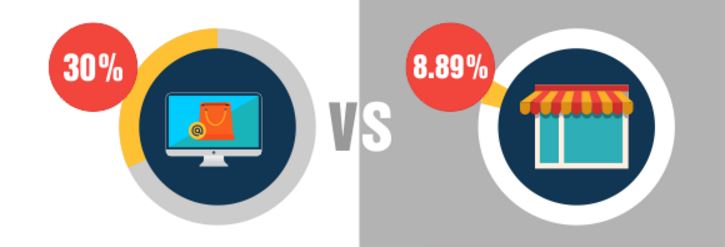Table of Contents
Definition: Advocacy Marketing is a type of marketing that focuses on getting your current customers to talk about your brand and products through tools such as testimonials, reviews, and social mentions. Since over 88% of shoppers research online before buying, brand advocates help new customers make decisions about the products that the buy.
The advantages of Advocacy Marketing?
These are the three things every business owner wants in their marketing strategy. And not only is advocacy marketing effective, it’s also effectively free. Let me explain…
A 2015 report by Nielsen, a global information and research organization, found that 83% of consumers place the most trust in the recommendations of friends and family.
No surprise there. But…They also found that 66% of people trust the opinions of consumers they found online.
In other words: People trust your brand advocates. Advocacy works because people are more likely to trust their peers – even if they don’t know them – over your advertising.
Besides, people want to share good experiences. Think about the last time you had an awesome time at a restaurant or event. Did you tell people about it? I’ll bet you told everyone who would listen.
It’s because sharing is built into our psychology TK. Giving someone the gift of a great experience is one of the most rewarding things in the world. (Which is why you should hit the share button on this article?).
That’s also why advocacy marketing is so affordable. It doesn’t really take any extra effort or money. It builds off previous investments with your customers.
What are those investments?
Keep reading to find out.
Advocates are your biggest fans. They’re the people who had an awesome time purchasing from your business. You either solved a deeply rooted need of theirs, or were just surprisingly better than average.
And that really is all it takes… being better than average.
Being better means being strategic. It means implementing live video marketing when your competition won’t, or giving away better prizes during your Instagram contests.
But to truly stand out – to really be better than average – you should focus on these five foundational principles:
Your product is where it all starts. I don’t care how great of an experience you provide; If you sell crap, people will complain that it stinks.
Conversely, a great product can often make up for a crappy experience. If you bought something you absolutely loved but hated the people you bought it from, you’ll still probably tell your friends to buy it. Even if it hurts a little.
This is because, just like businesses, it’s hard to find a product that’s significantly better than average. Most things are marginally useful, not truly amazing.
Moral of the story? If your product sucks, make it better.
Look at your complaints or your competitor’s complaints and address them. Use that feedback to improve the thing you’re selling. Otherwise, you may as well quit now.
I vacationed in Gatlinburg, Tennesee a while ago (right in the Smoky Mountains – awesome place to visit if you like hiking!).
While on my stay, my family and I went to an escape room in Pigeon Forge called The Escape Game. It was my first ever escape room and boy was I excited. I’d been wanting to do one for months.

When we got there, it was everything I’d hoped for and more. The employees were friendly, helpful, and in character. If people could give off an energy, theirs was glowing with empathy.
Then we got into the room… and holy cow. It was the best 60 minutes I’ve ever experienced with my family. We worked together like never before. I felt like I was in another world, completely cut off from reality. It felt like we really needed to escape.
But what amazed me the most was what happened after we left. My whole family talked about how great it was for the rest of the vacation. We were still talking about it for weeks afterward. We became brand advocates thanks to the experience.
And before you say, “Yea, but Bill, they sell experiences. It’s not the same as selling a product.”
I hear you. But you don’t have to have a physical location or sell an “experience” to actually sell an experience. When someone buys from your business, you’re selling them an experience, even if it’s the experience of buying a product online.
And it starts with selling a great product. But you can go further than that by providing a great unboxing experience with your packaging and a great user experience on your website. that increases conversion rates.
You can also provide a great customer service experience. (Don’t worry, that’s the last time I say experience. I think.)
Customer service is one of the easiest ways to stand out. (Let’s face it; most companies service is atrocious, but I won’t point fingers.)
Let me explain.
I recently purchased the Freelancer Planner from Michelle Nickolaisen. Actually, it was almost three months ago, but I just got it yesterday.
Right after buying it, she had a problem with her supplier/manufacturer that delayed shipment a little over a month. No big deal.

But then, my order somehow got lost. Almost three months after purchasing it, I emailed her. She apologized profusely, then proceeded to make up for a poor experience (sorry!). She gave me free priority shipping and a second planner for my girlfriend for free. That was pretty cool of her.
And when I got it, there was even a handwritten note apologizing again and saying she hopes I enjoy it. Her great customer service turned things around… and turned me into a brand advocate.
But again, let me reiterate… the planner is awesome. If the product sucked, I don’t care how good her service was. I wouldn’t have recommended it or been happy about it. It all starts with your product!
Pro Tip: Don’t neglect social media, either. I posted an image of the planner on Twitter, and she replied saying how she was glad it got to me quickly and that I liked it. The post took her all of two seconds to write, but reinforced my belief in her and her brand.
Did you know that 67% of shoppers check the returns page before making a purchase?
If they don’t like what they see, they bounce. Adiós.
Another fun fact: 30% of products ordered online are returned, versus just 8.89% in brick-and-mortar stores.

That means returns (and your return policy) are an inevitable staple in your business. They have a major impact on whether or not you can generate brand advocates. Oh, and not to beat a dead horse, but you’ll get fewer returns if you sell a great product. Just saying.
Check out this guide to writing a great return policy for some inspiration!
Finally…
According to Psychology Today, laughter is the single biggest factor in determining whether a marriage will last.
You’re probably wondering what the heck that has to do with advocacy marketing. Well… a lot, actually.
Think about it: What are advocates? People who love and promote a brand and its products.
Marriage and advocacy are both, in a sense, about love and building a bond.
While I’m not suggesting you try to marry your customers, I am telling you that you have a relationship with them. And all relationships, romantic or otherwise, are improved with laughter.
Besides, what’s life without a little fun? All work and no play makes Johny a dull boy!
For some fun inspiration, check out these hilarious customer service examples.
Don’t forget that your website design is a huge part of the whole process. With the available templates, there’s no reason for your eCommerce store to not fit the look and feel of your brand. You can find a variety of templates for your eCommerce store with WooCommerce, Magento, Shopify, etc. Experiment with different features, layouts and designs to create a breath-taking store that makes your customers want to advocate for your brand.
Now you’ll want to show all those positive opinions and the content that your advocates share online about your brand on your online store. Integrating this content into the buying process can increase conversion rates in a 10-15%.
Curious about how UGC can transform your marketing strategy? Get your demo now!
Check out how Meller brand integrates their customers’ advocate photos into their product pages to increase conversions:

By now I hope you understand that advocacy marketing isn’t really a marketing strategy; It’s a way of life.
If you just focus on being better, every single day, you’ll naturally attract advocates. And they’ll create more advocates and so on until you have a small army of loyal customers.
Look at all the great companies. Companies like Apple, Microsoft, Toyota, or GE. They may not all be better than average now, but to get to where they are, they had to be amazing at one point or another. They had to be far better than average.
That’s how they built their audience. That’s how they became so successful.
Advocacy marketing can skyrocket your business. All it takes is a commitment to excellence.